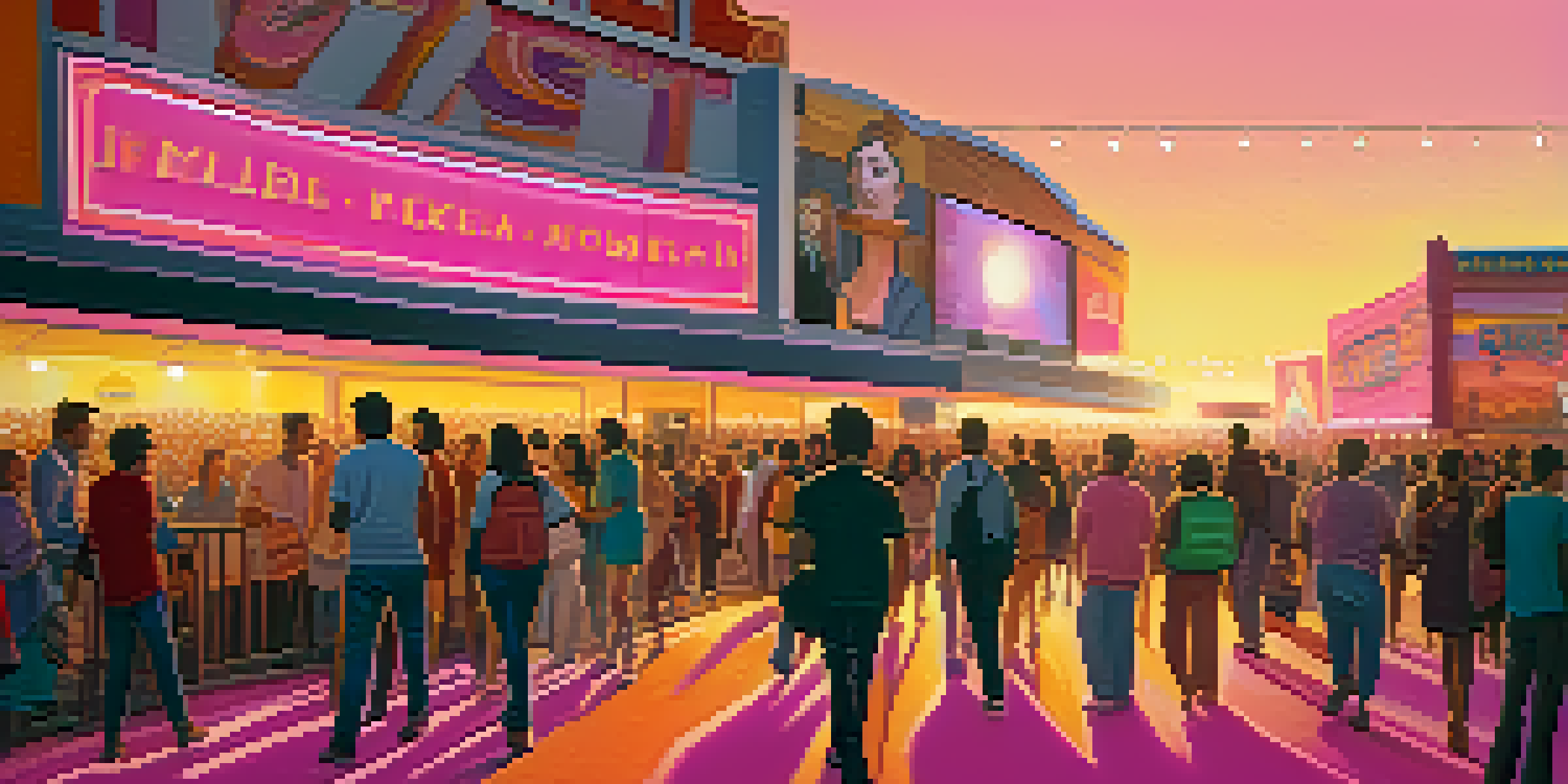Film Festivals: A Platform for Diverse Voices in Cinema

The Importance of Film Festivals in Today's Cinema Landscape
Film festivals serve as pivotal platforms for filmmakers, especially those from underrepresented communities. They provide a unique space where diverse stories can be showcased and celebrated. With the growing demand for inclusivity in media, these festivals are more crucial than ever in amplifying voices that often go unheard.
Film festivals are a great opportunity for filmmakers to showcase their work to an audience that appreciates their efforts.
By highlighting a variety of perspectives, film festivals help break down stereotypes and promote understanding among different cultures. They encourage filmmakers to explore themes related to identity, race, gender, and social issues, which enrich the cinematic landscape. As audiences seek more relatable content, festivals become a beacon for innovative storytelling.
Moreover, these events often attract industry professionals, providing filmmakers with opportunities for networking and collaboration. This exposure can lead to distribution deals and funding for future projects, ultimately creating a ripple effect that benefits the entire film community.
Spotlighting Emerging Talent Through Festival Platforms
Many film festivals are known for showcasing emerging talent, offering a springboard for new filmmakers. For instance, the Sundance Film Festival has been instrumental in launching the careers of many now-renowned directors. By attending these festivals, audiences can discover fresh voices and innovative storytelling techniques.

These events often feature short films and debut features that might not find a place in traditional theaters. This emphasis on new talent allows for a diverse range of stories to emerge, reflecting the multifaceted nature of modern society. The celebration of emerging filmmakers also inspires a new generation to tell their own stories.
Film Festivals Amplify Diverse Voices
These events provide essential platforms for underrepresented filmmakers to showcase unique stories and perspectives.
Additionally, awards and recognition at festivals can significantly impact a filmmaker's career. Winning a prestigious award can lead to increased visibility and opportunities, making these festivals essential stepping stones for aspiring creators.
Diversity in Film Festivals: A Focus on Inclusion
Diversity is at the heart of many film festivals, with a commitment to inclusivity driving their programming. Festivals like the Toronto International Film Festival (TIFF) actively seek to represent a range of voices, including those from marginalized communities. This commitment helps ensure that a variety of perspectives are seen and heard.
Diversity is not a set-aside program for the arts; it is the DNA of creativity.
Inclusion extends beyond just the films themselves; it also encompasses the filmmakers behind the camera. Many festivals have initiatives aimed at supporting women, LGBTQ+ individuals, and people of color in the industry. By prioritizing diversity, festivals not only enhance their offerings but also contribute to a broader cultural dialogue.
Moreover, these inclusive practices help to cultivate a sense of community among filmmakers and audiences alike. When people from different backgrounds come together to celebrate cinema, it fosters mutual respect and understanding, reinforcing the power of storytelling.
Film Festivals: A Catalyst for Cultural Exchange
Film festivals act as cultural exchange hubs, where filmmakers and audiences from various backgrounds share their experiences and stories. This interaction fosters a deeper understanding of different cultures and societal issues. By watching films from around the world, audiences can gain insight into the lives of others, promoting empathy and connection.
For example, festivals like Cannes and Berlin attract international filmmakers, showcasing a wide array of cultural narratives. These events often spark conversations about global issues, allowing filmmakers to use their art as a form of activism. Such exchanges enrich both the film community and the audiences who engage with these narratives.
Emerging Talent Finds a Stage
Film festivals serve as launchpads for new filmmakers, offering recognition and opportunities to share innovative storytelling.
Additionally, many festivals incorporate workshops and panels that encourage dialogue about the films presented. These discussions can address the significance of cultural representation in cinema, providing a platform for filmmakers to share their perspectives and experiences.
How Film Festivals Influence Industry Trends
Film festivals are often at the forefront of new trends in the industry, shaping the future of cinema. By showcasing innovative storytelling and diverse voices, these festivals spark conversations that can lead to shifts in mainstream cinema. This influence is significant as it can help to diversify the types of films produced and distributed.
For instance, the success of films that received recognition at festivals can prompt studios to invest in similar projects. This trend is evident in the rise of independent films that tackle complex themes and showcase diverse characters. The festival circuit often serves as a testing ground for these films, providing valuable feedback from audiences and industry professionals.
Furthermore, festivals can also impact audience expectations. As viewers become more accustomed to diverse narratives, they may demand more representation in mainstream films. This shift ultimately encourages studios to diversify their offerings, leading to a more inclusive cinematic landscape.
The Role of Technology in Expanding Festival Reach
In recent years, technology has played a pivotal role in expanding the reach of film festivals. Virtual screenings and online platforms have made it possible for audiences worldwide to access festival films from the comfort of their homes. This accessibility has opened doors for filmmakers to showcase their work to a larger audience, regardless of geographic limitations.
Additionally, social media has become an essential tool for festivals to engage with audiences and promote their films. Through platforms like Instagram and Twitter, festivals can create buzz around their events and interact directly with viewers. This engagement not only builds excitement but also fosters a sense of community among film lovers.
Technology Expands Festival Accessibility
Advancements in technology have made film festivals more accessible, allowing global audiences to engage with diverse narratives online.
However, while technology enhances accessibility, it also presents challenges in terms of maintaining the festival atmosphere. Striking a balance between in-person and virtual experiences is crucial to preserving the unique essence of film festivals. Still, as technology evolves, it promises to pave the way for even more inclusive and far-reaching festival experiences.
The Future of Film Festivals and Diverse Storytelling
As we look to the future, film festivals will continue to be vital in promoting diverse storytelling. With an increasing focus on representation, these festivals can help shape the narratives that dominate the industry. The growing demand for authenticity in storytelling suggests that the importance of these platforms will only continue to rise.
Moreover, as societal conversations around race, gender, and identity evolve, festivals will likely adapt to highlight these issues. This responsiveness will be essential in fostering a cinematic landscape that reflects the complexity of our world. By encouraging filmmakers to share their unique perspectives, festivals contribute to a richer, more nuanced understanding of global culture.

In conclusion, the future of film festivals lies in their ability to embrace change and champion diverse voices. By remaining committed to inclusivity and cultural exchange, they will continue to serve as essential platforms for storytelling that resonates with audiences everywhere.